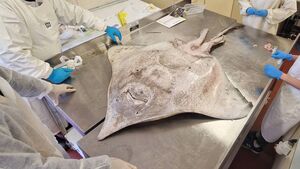Critically endangered fish washes ashore in Mayo

Flapper Skate. Image credit: Louise Overy
Munster Technological University (MTU) has contributed to the scientific response to the discovery of two critically endangered Flapper Skate (Dipturus intermedius) that washed ashore in Co. Mayo in May 2025.
The stranding, reported by members of the public and relayed to the Irish Whale and Dolphin Group’s stranding network, presented a rare opportunity for marine researchers to collect essential data on one of the most threatened elasmobranch species in Europe.
Marine scientists, including Louise Overy, Wildlife Biology Lecturer at MTU and Vice Chair of the Irish Elasmobranch Group (IEG), collaborated with Dr Catherine Waters and Alan Drumm of the Marine Institute, and Dr Danielle Orrell of University College Cork (UCC) to analyse the individuals.
The Flapper Skate is the largest skate species in the world, and it can reach up to 2.5 metres in length. They are classified as critically endangered by the IUCN and are at risk of extinction. They are particularly at risk to any population declines as they are slow growing, late to mature and slow to reproduce therefore they take a considerable time to recover from any population losses. Female skate only reach maturity between 7 and 26 years of age and produce as few as 40 eggs per year, which develop for 18 months before finally hatching one individual skate.
"The recent stranding of these two skates presents a unique opportunity to gather samples and insight into these incredible animals found in Irish waters", said Dr. Danielle Orrell, a UCC marine biologist of the CETUS research team who helped to coordinate the dissection. "The findings will provide valuable insights into the physiology and ecology of this Critically Endangered species."
The dissections were done at MTU’s field laboratory with analysis conducted by researchers from the Marine Institute, UCC and MTU. A range of biological samples and measurements were collected, contributing to regional and national datasets. The study adds to the conservation efforts for the species that are being undertaken, including mark-recapture and electronic tagging to identify their distribution and space use.
Dr Catherine Waters of the Marine Institute said, "This incident offers the chance to learn more about the remaining population of Flapper skate that are still present in Irish waters and offers the chance for essential knowledge exchange and to develop our current knowledge and therefore inform the ongoing conservation for this species.”
Louise Overy, Wildlife Biology Lecturer at MTU, added, “Elasmobranchs around the world are facing mounting pressures, with over one-third of species now considered at risk of extinction. Addressing this crisis requires a broad, collaborative, and sustained global effort. The event hosted here at MTU highlights the importance of scientific collaboration and knowledge-sharing in advancing elasmobranch conservation.”




